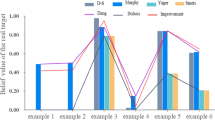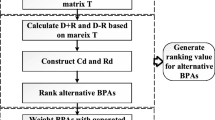Abstract
There exist many rules to combine the available pieces of information in Dempster-Shafer theory of Evidence (DST). The first one of them was the Dempster’s rule of combination (DRC), which has some known drawbacks. In the literature, many rules have tried to solve the problems founds on DRC but normally they have other non-desirable behaviors too. In this paper, it is proposed a set of mathematical properties that a rule of that type should verify; it is analyzed some of the most used alternatives to the DRC including some of the last hybrid rules, via their properties and behaviors; and it is presented a new hybrid rule that satisfies an important set of properties and does not suffer from the counterintuitive behaviors of other rules.
Access this chapter
Tax calculation will be finalised at checkout
Purchases are for personal use only
Similar content being viewed by others
Notes
- 1.
In this work we consider that the sources of information are independent, which is not always true in the reality.
- 2.
If we have the aim to use these rules in applications, other property could be added about the complexity of the rule that allows us to use it easily.
References
Abellán, J.: Combining nonspecificity measures in Dempster-Shafer theory of evidence. Int. J. Gen. Syst. 40(6), 611–622 (2011)
Abellán, J., Castellano, J.G., Moral-García, S., Mantas, C.J., Benítez, M.D.: A decision support tool for credit domains: Bayesian network with a variable selector based on imprecise probabilities. Int. J. Inf. Technol. Decis. Making (2017, submitted)
Abellán, J., Klir, G., Moral, S.: Disaggregated total uncertainty measure for credal sets. Int. J. Gen. Syst. 35(1), 29–44 (2006)
Dempster, A.P.: Upper and lower probabilities induced by a multivalued mapping. Ann. Math. Stat. 38(2), 325–339 (1967)
Dubois, D., Prade, H.: Combination and propagation of uncertainty with belief functions: a reexamination. In: Proceedings of the 9th International Joint Conference on Artificial Intelligence - Volume 1, IJCAI 1985, pp. 111–113. Morgan Kaufmann Publishers Inc., San Francisco (1985)
Dubois, D., Prade, H.: On the combination of evidence in various mathematical frameworks. In: Flamm, J., Luisi, T. (eds.) Reliability Data Collection and Analysis. EURR, vol. 3, pp. 213–241. Springer, Dordrecht (1992). https://doi.org/10.1007/978-94-011-2438-6_13
Dymova, L., Sevastjanov, P., Tkacz, K., Cheherava, T.: A new measure of conflict and hybrid combination rules in the evidence theory. In: Rutkowski, L., Korytkowski, M., Scherer, R., Tadeusiewicz, R., Zadeh, L.A., Zurada, J.M. (eds.) ICAISC 2014. LNCS (LNAI), vol. 8468, pp. 411–422. Springer, Cham (2014). https://doi.org/10.1007/978-3-319-07176-3_36
Klir, G.J.: Uncertainty and Information: Foundations of Generalized Information Theory. Wiley, Hoboken (2005)
Murphy, C.K.: Combining belief functions when evidence conflicts. Decis. Support Syst. 29(1), 1–9 (2000)
Shafer, G.: A Mathematical Theory of Evidence. Princeton University Press, Princeton (1976)
Yager, R.R.: On the Dempster-Shafer framework and new combination rules. Inf. Sci. 41(2), 93–137 (1987)
Zadeh, L.A.: Review of a mathematical theory of evidence. AI Mag. 5(3), 81–83 (1984)
Acknowledgments
This work has been supported by the Spanish “Ministerio de Economía y Competitividad” and by “Fondo Europeo de Desarrollo Regional” (FEDER) under Project TEC2015-69496-R.
Author information
Authors and Affiliations
Corresponding author
Editor information
Editors and Affiliations
Rights and permissions
Copyright information
© 2019 Springer Nature Switzerland AG
About this paper
Cite this paper
Abellán, J., Moral-García, S., Benítez, M.D. (2019). Combination in Dempster-Shafer Theory Based on a Disagreement Factor Between Evidences. In: Kern-Isberner, G., Ognjanović, Z. (eds) Symbolic and Quantitative Approaches to Reasoning with Uncertainty. ECSQARU 2019. Lecture Notes in Computer Science(), vol 11726. Springer, Cham. https://doi.org/10.1007/978-3-030-29765-7_13
Download citation
DOI: https://doi.org/10.1007/978-3-030-29765-7_13
Published:
Publisher Name: Springer, Cham
Print ISBN: 978-3-030-29764-0
Online ISBN: 978-3-030-29765-7
eBook Packages: Computer ScienceComputer Science (R0)




